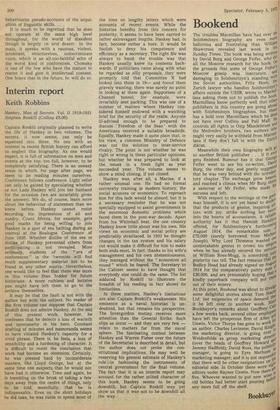Interim report
Keith Robbins
Hankey, Man of Secrets. Vol. II 1919-1931 Stephen Roskill (Collins £5.00) Captain Roskill originally planned to write the life of Hankey in two volumes. The secrets, it now seems, can only be squeezed into three. No one with an interest in recent British history can afford to neglect this biography. As one would expect, it is full of information on men and events at the top: too full, however, to be completely satisfying. There is an uneasy sense in which, for page after page, we seem to be reading minutes ourselves. Conference follows conference. Light relief can only be gained by speculating whether or not Lady Hankey will join her husband for the occasion (we are invariably given the answer). We do, of course, learn more about the behaviour of statesmen than we knew before. Hankey cannot resist recording his impressions of all and sundry. Count Sforza, for example, gets good marks for being willing to join Hankey in a spot of sea bathing during an interval at the Boulogne Conference of June 1920. Whether dislike of the sea or dislike of Hankey prevented others from participating is not revealed. More seriously, students of the " era of conferences" in the 'twenties will find much supplementary material not to be found in any other source. Nevertheless, one would like to feel that there was more in this volume than fodder for future historians. A more ruthless and incisive pen might have left them to go to the archive themselves.
It may be that the fault is not with the author but with the subject. No reader of the first volume can suppose that Captain Roskill does not admire Hankey. At the end of this present work, however, he confesses that he detects a loss of warmth and spontaneity in his hero. Constant drafting of minutes and memoranda seems to have vitiated Hankey's capacity for a vivid phrase. There is, he feels, a loss of sensibility and a hardening of character. It is difficult to resist the conclusion that work had become an obsession. Certainly, he was pressed hard by inconsiderate masters, like Lloyd George, but at the same time one suspects that he would not have had it otherwise. Time and again, he is trembling on the brink of taking a few days away from the centre of things, only to be told, mercifully, that he is indispensable. Even on the short holidays he did take, he was liable to spend most of the time on lengthy letters which were accounts of recent events. While the historian benefits from this concern for posterity, it seems to have been carried to rather extravagant lengths. Hankey had, in fact, become rather a bore. It would be foolish to deny his competence and efficiency as a secretary. The right file was always to hand: the trouble was that Hankey usually knew its contents backwards. If politicians came along with what he regarded as silly proposals, ,they were promptly told that Committee X had looked into them in 19— and found them gravely wanting; there was surely no point in looking at them again. Supporters of a Channel tunnel, for example, were invariably sent packing. This was one of a number of matters where Hankey considered himself endowed with a watching brief for the security of the realm. Anyone ill-advised enough to be prepared to discuss ' Freedom of the Seas' with the Americans received a suitable broadside. Equally, Hankey made it quite plain that, in his view, a common Ministry of Defence was not the solution to inter-service rivalry. The point is not whether he was right or wrong in these particular opinions, but whether he was prepared to look at the issues in a fresh light as year succeeded year. This volume seems to show a mind closing, if not closed.
Hankey was, after all. a Marine. if a rather unusual one. He had no formal university training in modern history, the social sciences or economics. To reproach him for this lack would be absurd, but it is a necessary reminder that he was not specially equipped to assist governments in the enormous domestic problems which faced them in the post-war decade. Apart from his Whitehall beat, the one country Hankey knew little about was his own. His views on economic and social policy are predictably straitlaced. In 1931 he thought changes in the tax system and his salary cut would make it difficult for him to make both ends meet. In fact, thanks to his wife's management and his own abstemiousness, they managed without the "economies all round" which he feared. The Secretary to the Cabinet seems to have thought that everybody else could do the same. The list adduced by Roskill to illustrate the breadth of his reading in fact shows its limitations.
In these matters, Hankey's limitations are also Captain Roskill's weaknesses. His eminence as a naval historian is undoubted, but that remains his perspective. The Invergordon mutiny receives more attention than the General Strike. Such slips as occur — and they are very few — relate to matters far from the naval sphere. The fascinating contest between Hankey and Warren Fisher over the future of the Secretariat is described in detail, but the author does not probe the con stitutional implications. He may well be reserving his general estimate of Hankey's role in fashioning the instruments of central government for the final volume.
The fact that it is an interim report may account for the rather stilted character of this book. Hankey seems to be going downhill, but Captain Roskill may yet show us that it was not to be downhill all the way.










































 Previous page
Previous page